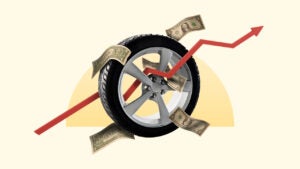Average car payments in 2025: What to expect

Key takeaways
- Monthly car payments continue to hit record levels for both new and used cars.
- Auto loan interest rates may continue to decrease and could potentially reach their lowest levels since 2023.
- The overall cost of car ownership remains elevated due to steep insurance and car maintenance prices in addition to the cost of a loan.
- Good credit scores are key to securing the best auto loan rates and walking away with a lower-than-average monthly payment.
Heading into 2026, new car prices remain steep, with monthly payments for new cars soaring to the highest levels ever recorded. Amid this environment, buyers are taking on increasingly larger loans to make vehicle purchases, and some are also stretching repayment over a longer timeline — in some cases, up to seven years.
Whether you have poor credit or are looking to refinance your current loan, it’s important to understand typical monthly payments and rates so you can feel confident that you are getting the best deal. While auto loan rates in 2026 are projected to lower slightly, it won’t be enough to put a serious dent in the many factors that are driving up the cost of car ownership, including continued high cost of auto insurance and maintenance expenses.
Car payment statistics
- The average monthly car payment for a new car reached $772 in the fourth quarter of 2025, while used cars had a slightly lower average of $570, according to Edmunds.
- The percent of new car payments over $1,000 has reached a record 20.3% — an increase from 18.9% at the end of 2024.
- This increase in monthly payment is due in part to the high cost of cars, with loan amounts for new cars averaging $43,759 at the end of 2025.
- Longer loan terms are also becoming more common, with a fifth (20.8%) of new car loan terms lasting 84 months or longer.
- Banks are the most common choice for financing new and used auto loans (31.30%), but credit unions (23.72%) and captive financing (18.98%) follow shortly behind.
- The average cost of full coverage car insurance is about $225 per month for full coverage and $68 per month for minimum coverage.
What is the average monthly car payment?
The average monthly payment for new cars sat between $700 and $800 in the third quarter of 2025, according to Experian. Used cars had a smaller range, from around $500 to a little over $550.
| New cars | Used cars | |
|---|---|---|
| 781 to 850 (super prime) | $727 | $527 |
| 661 to 780 (prime) | $754 | $519 |
| 601 to 660 (near prime) | $793 | $543 |
| 501 to 600 (subprime) | $780 | $555 |
| 300 to 500 (deep subprime) | $748 | $556 |
Although the current average monthly payment for a new and used car is $748 and $532, respectively, car payments are based on more than just the cost of the vehicle. You can calculate your car payment based on the amount you borrow, your annual percentage rate (APR) and loan term.
Average auto loan rates
Auto loan rates have a direct impact on the cost of your monthly car payment: If you qualify for a lower rate, your monthly car payment is less and conversely, higher rates drive up the amount of your monthly payment.
| New cars | Used cars | |
|---|---|---|
| 781 to 850 (super prime) | 4.88% | 7.43% |
| 661 to 780 (prime) | 6.51% | 9.65% |
| 601 to 660 (nonprime) | 9.77% | 14.11% |
| 501 to 600 (subprime) | 13.34% | 19.00% |
| 300 to 500 (deep subprime) | 15.85% | 21.60% |
Finding a lower rate by shopping with multiple lenders can be a more cost-effective way to lower your monthly payment. However, that can be challenging if you have poor credit or minimal credit history. Comparing bad credit auto loan lenders may help you secure a more competitive rate.
Average auto loan amounts
Average loan amounts don’t quite correlate with car prices — because of down payments, people need to borrow less than the total cost of the vehicle. However, they have still seen a steady increase since 2022, which is driven, in part, by increased vehicle prices.
| New cars | Used cars | |
|---|---|---|
| 781 to 850 (super prime) | $40,534 | $29,172 |
| 661 to 780 (prime) | $44,480 | $28,270 |
| 601 to 660 (nonprime) | $44,526 | $26,104 |
| 501 to 600 (subprime) | $39,841 | $23,020 |
| 300 to 500 (deep subprime) | $35,286 | $21,149 |
Average auto loan terms
Auto loans are typically available in 12-month increments from 24 to 96 months. The most common terms are 60 and 72 months, but 84-month terms are becoming more popular as vehicle prices increase.
| Credit score | New cars | Used cars |
|---|---|---|
| 781 to 850 (super prime) | 64.80 months | 65.86 months |
| 661 to 780 (prime) | 72.01 months | 68.54 months |
| 601 to 660 (nonprime) | 75.03 months | 68.30 months |
| 501 to 600 (subprime) | 74.30 months | 66.58 months |
| 300 to 500 (deep subprime) | 72.66 months | 64.56 months |
Budgeting for car payments
Figuring out your budget for an auto loan can be tricky. It’s tempting to think in terms of monthly payments, but low payments often require longer terms, which increase the overall cost of your vehicle.
And remember, your vehicle will be losing value while you’re making those payments. Depreciation leads to a loss of up to 60%, according to Kelley Blue Book. The longer you continue to make payments on a car, the more likely you are to become underwater or upside-down on your car loan.
Instead of monthly payments, determine the total amount you want to spend on a car — including expected insurance costs, maintenance and repairs. If you know how much you are able to spend, you can select a loan that fits your budget rather than letting a payment set your budget for you.
How to calculate how much your car costs
Calculating your car’s cost gives you a better sense of the monthly payment you can afford. To determine how much your vehicle will truly cost, you must make some estimates.
- Use Edmunds’ car maintenance calculator to factor in the average cost based on your vehicle.
- Add the cost of car insurance. Some vehicles may have higher insurance premiums based on factors like safety features and repair costs.
- Calculate your estimated fuel costs using your car’s average miles per gallon, your estimated monthly mileage, and the average fuel costs in your area.
- Factor in the registration fees and taxes you’ll have to pay, along with the vehicle depreciation.
Reduce your monthly payments — and total purchase cost — by making a down payment. According to data from Edmunds, drivers put down on average $6,856 for new cars and $4.219 for used cars in the fourth quarter of 2024. If you have a trade-in, that would also count toward your down payment.
Bottom line
Although auto loan rates are affected by many factors beyond your control, smart choices can put you in the driver’s seat when it comes to this big purchase. Current interest rates will make monthly payments more expensive, so be patient. Take the time to compare different rates and build your credit score to qualify for better auto loan rates.
Why we ask for feedback Your feedback helps us improve our content and services. It takes less than a minute to complete.
Your responses are anonymous and will only be used for improving our website.
You may also like

Average monthly mortgage payment





